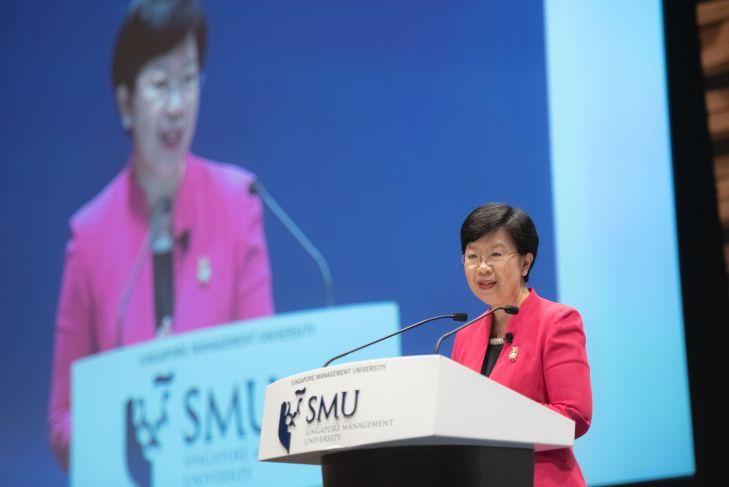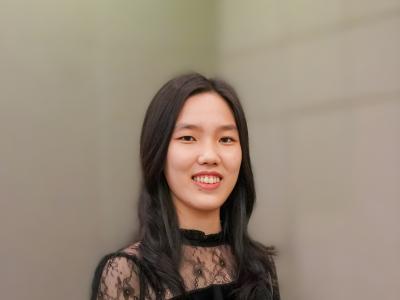
In her first address as SMU President, Professor Lily Kong shared the strategic directions, goals and priorities for the University for the next few years. "What do we want to achieve and why is this important? Let me phrase the question in a different way: what is our garden and what is our journey of purpose?" she asked. She pointed out that in view of the current global environment which is influenced by mega trends including the rise of Asia, changes in demographics and the global economy, as well as technological advancement, the university of today has multiple roles to play. These include preparing the workforce, serving as key drivers of innovation and national competitiveness through research, as well as contributing to the nurturing of better citizens and more resilient societies.
Professor Kong said that in this respect, SMU seeks to influence and shape the next generation of leaders and entrepreneurs, while contributing, through research and knowledge production, to make meaningful impact on economy, society and polity.”
“Impact is about delivering a holistic and transformative education which then enables our students and graduates to make a meaningful impact on the world. Impact is also about addressing societal challenges through research, and thereby improve our world,” she said, adding that SMU will strive to achieve this through four strategies emphasising Integration, Industry, Innovation and Internationalisation.

The University will promote integration across multiple dimensions. These include integrating across curriculum and co-curricular activities for undergraduates; integrating pre-employment training (PET) and continuing education and training (CET) to promote life-long learning; as well as further expanding integration across SMU Schools, and research Centres, Institutes and Labs (ICLs) to promote multi-disciplinary research and programmes. Professor Kong highlighted that the University will ride on the momentum of its successful inter-disciplinary programmes launched in recent years, and suggested the possibility of allowing a select group of students to declare their ‘missions’ and devise their own integrated majors with faculty guidance.
In its pursuit of meaningful and impactful inter- and multi-disciplinary research, she also announced the five areas of societal challenges in which SMU will focus its research, namely: interpreting economies and financial markets; strengthening social fabric and quality of life; navigating boundaries and borders; managing for sustainability; and advancing innovation and technology. To leverage maximum synergies among its existing ICLs, SMU will also look into further clustering them around cognate areas, with the aim to create meta-institutes, such as in A.I. and Data Analytics, and in Competition, Innovation and Transformations.
Professor Kong envisages that SMU will strengthen and deepen its partnerships with industry – private, public and NGO sectors – through education, research and outreach. She iterated that the research partnership models can be varied and bespoke, and highlighted that it might even be conceivable to house some companies on SMU’s city campus to benefit the corporates, academia and students. As Singapore’s only University in the city, SMU endeavours to have a reverberating voice in the community, to contribute thought leadership and ideas, as well as to be a place in the city where compelling and relevant ideas are being discussed and debated. SMU City Dialogues is one such outreach platform which is being developed, where SMU aims to engage the broader community in discourse on topics that matter to the ‘city’, such as reducing inequality and remaking the economy.

SMU plans to step up efforts to cultivate innovation and entrepreneurship talent by scaling up its Global Innovation Immersion Programme as well as its support towards venture-backed start-ups. It also aims to increase its ‘innovation density’ by positioning its city campus as a meeting point to connect like-minded people with different talents and ideas. To facilitate this, the Tahir Foundation Connexion currently being built will include an ‘Innovation Bridge’ that features 500 sqm of incubation space for start-ups and will provide an environment that fosters innovation and entrepreneurship among SMU students and alumni, and with the larger community.
In the coming years, SMU’s internationalisation efforts will be focused on enlarging and enriching global education opportunities for its students and allowing them to be exposed to the entrepreneurial ecosystems in larger markets; as well as to forge more academic and research partnerships. In particular, SMU is looking into establishing physical footprint in selected ASEAN cities, such as Bangkok, Manila, Ho Chi Minh City and Jakarta, in the form of Global Centres. These Centres will serve to coordinate and strengthen the University’s activities and collaboration with various stakeholders across geographies.
At the end of the event, Professor Kong also introduced SMU’s new Provost and Dean for the SMU School of Social Sciences (SOSS). Provost-Designate Professor Timothy Clark will take office from 1 April 2019, while SMU SOSS Dean-Designate Professor Chandran Kukathas will join the University from 1 July 2019.
Professor Timothy Clark is presently Pro-Vice-Chancellor (Social Sciences and Health) at Durham University where he is Head of the Faculty of Social Sciences and Health, which comprises 11 departments representing a broad range of disciplines. These include Sociology, Archaeology, Durham University Business School, the School of Government and International Affairs, Durham Law School, and Sport and Exercise Sciences.
Professor Chandran Kukathas is the Head, Department of Government at the London School of Economics and Political Science (LSE). He also serves as the Chair of Political Theory in the Department of Government and as Warden of High Holborn and Grosvenor House Halls of Residence at LSE. Prior to his appointment at LSE, he has taught at the University of New South Wales, Oxford University, Australian National University and the University of Utah.
Comments on the President’s inaugural address
The audience had a sense that Professor Kong has an ambitious and well articulated strategy and agenda to further strengthen the University and to position it for its third decade. I think most people will vividly remember her message of the pursuit of Impact through the 4I’s: Integration, Industry, Innovation, and Internationalisation.
Prof Steven Miller, Vice Provost (Research)
Professor Kong started with a very insightful discussion of the changes we are faced with in higher education, in particular the technological changes and the changes in demography, which will have a profound impact on the higher education landscape in the years to come. She then outlined her vision and hope for SMU through the 4Is strategy.
Prof Cheng Qiang, Dean, School of Accountancy
A key message was that our people play a vital role and success will depend very much on execution. It is now up to each and every one of us to align with the greater objectives of the University and not just be focused on our own department’s goals. Collaboration is key.
Mr Lau Kai Cheong, Chief Information Officer and Vice President,
Integrated Information Technology Services
Professor Kong acknowledged the past, the pioneers of SMU, our history and the importance of reflection, learning from experience in order to help us build a better future, especially as we enter our third decade in 2020. We mustn’t lose our pioneering spirit whilst we tackle new challenges of the changing environment, especially the new world of global and local higher education.
Ms Gulcin Cribb, University Librarian
One of her key messages was that we need to work more collaboratively together. That as we mature, we can work together in an open collegiate setting, constructively expressing how we can be of help to other offices and departments in the things we do. For this to work, everyone will need to fully embrace the ‘one SMU’ principle and not focussed narrowly on our own KPIs and deliverables.
Assoc Prof Themin Suwardy, Dean, Postgraduate Professional Programmes
Professor Kong’s very warm and welcoming address strategically addressed how she wants to take SMU to the next level through ‘4is’. With regards to behavioural change, I believe we all can become more collaborative – offering and seeking support to and from others.
Dr Katharina Lange, Executive Director, Executive Development
The image of the Garden was a powerful metaphor as it offered many layers of interpretation, the most vivid of which for me was the idea that we are all gardeners and landscapers that need to work together towards a shared vision. Also, the call to shift from ‘Ego to Eco’ and ‘Me to We’ and the corresponding appeal for us to look at ourselves as to which behaviours we would need to change first, drove home the point about personal responsibility.
Dr Bervyn Lee, Director, Office of Alumni Relations
The garden metaphor is memorable and quotable. Generally, I am heartened that we all have a part to play and a place in SMU’s garden. I will be focusing on the integration between curriculum and CCAs; as well as streamlining my office’s workplan so that we do not undertake tasks that may not need to be done; or do them differently. Happier and healthier gardeners will produce a happier and healthier garden.
Mr Jimmy Ye, Director, Office of Student Life
After the address, I was reflecting on a key question posed by Prof Kong ‘What is our garden and what is our journey of purpose?’ All of us can be distracted with ‘busyness’. It is important for us to seek purpose with meaningful work and relationships. Her question motivates me to think about ‘Why am I in SMU and how do I make meaningful impact?’
Assoc Prof Seow Poh Sun, School of Accountancy
Professor Kong’s message was very clearly aimed at harnessing SMU’s positive momentum to bring us forward into our next phase of growth. The 4Is – which are bold, inspirational, and innovative – are aimed at positioning SMU as a leader in Higher Education, while remaining deeply rooted in our academic and social endeavours.
Assistant Prof Aidan Wong, School of Social Sciences
I think the audience could grasp the enormity of the challenges facing SMU and the breadth of the task that lies ahead. At the same time, they were also assured that what would help us surmount these challenges are fundamental principles that we have held onto, such as having a vision of making meaningful impact, cultivating the right spirit and working collaboratively.
Assistant Prof Dorcas Quek, School of Law
Professor Kong certainly inspired me – to believe that my work counts for the greater cause that we are all working towards for the University. I also felt that she wanted us to know that we could go to her directly for any advice, and where she could, was happy to address whatever concerns we may have. Knowing this, will make me more forthcoming in my dealings with her.
Ms Joanna Yap, Senior Assistant Director, Office of Advancement
A key priority identified in the address is the strengthening of collaboration across the University, as evidenced by the ‘One SMU’ concept. This message resonated with me, as I believe strongly that properly harnessed, the whole is greater than the sum of its parts. I am excited to think how I can contribute towards cross-functional work and learn from the expertise of colleagues from other offices.
Mr Zhuo Yuehan, Senior Manager, Office of the Provost
I think the key to responding to Prof Kong’s call for the University to become a more ‘collaborative, forward-looking and fleet-footed organisation’ is to strive towards the same attributes that we hope to instil in our graduates. We should aspire to have independence of mind and dependability in deed, to think deeply and broadly while seeking to create value in our work as well as with others.
Mr Melvyck Leong, Manager, International Office
Read the Address.
Watch the recording.
View the photos on Facebook.

